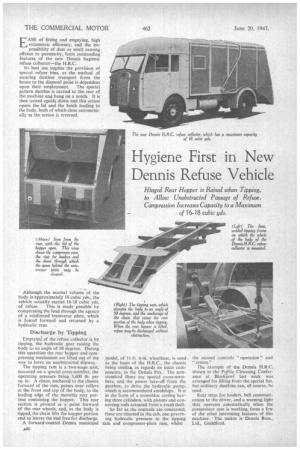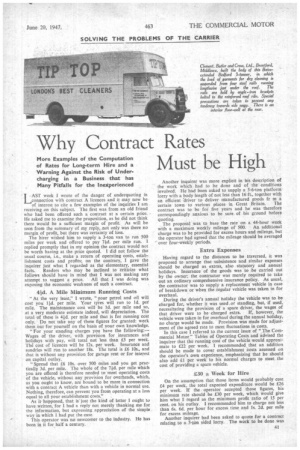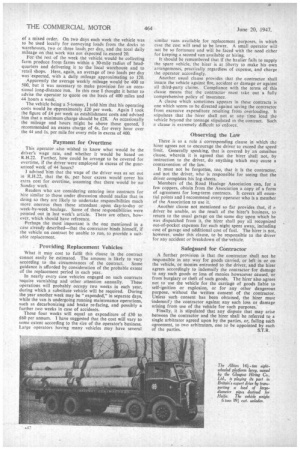Hygiene First in New Dennis Refuse Vehicle
Page 50

Page 51

Page 52

If you've noticed an error in this article please click here to report it so we can fix it.
Why Contract Rates Must be High
EASE of fitting and emptying, high volumetric efficiency, and the impossibility of dust or smell causing offence to passers-by, form outstanding features of the new Dennis hygienic refuse collector—the H.R.C.
Its best use implies the provision of special refuse bins, as the method of securing dustless transport from the house to the disposal point is dependent upon their employment. The special pattern dustbin is carried to the rear of the machine and hung on a notch. It is then turned upside down and this action opens the lid and the hatch leading to the body, both of which close automatically as the action is reversed.
Although the normal volume of the body is approximately 1-4 cubic yds., the vehicle actually carries 16-18 cubic yds.
of iefuse. This is made possible by compressing the load through the agency of a reinforced transverse plate, which is forced forward and returned by a hydraulic ram.
Discharge by Tipping
Emptyint; of the refuse collector is by tipping, the hydraulic gear raising the body to an angle of 50 degrees. During this operation the rear hopper and compressing mechanism are lifted out of the way to leave an unobstructed slipway.
The tipping ram is a two-stage unit, mounted on a special cross-member, the operating pressure being 3,600 lb. per sq. in. A chain, anchored to the chassis forward of the ram, passes over rollers at the front and top of the body, to the leading edge of the movable rear portion containing the hopper. This rear section is pivoted at a point forward of the rear wheels, and, as the body is tipped, the chain lifts the hopper portion and so leaves the end free for discharge.
A forward-control Dennis municipal model, of 11-ft. 6-in, wheelbase, is used as the basis of the H.R.C,, the chassis being similatk as regards its main components, to the Dennis Pax. The nonstandard items are special cross-members, and the power take-off from the gearbox, to drive the hydraulic pump, which is accommodated amidships. ft is in the form of a monobloe casting having three cylinders, with pistons and connecting rods actuated from a crankshaft.
So far as the controls are concerned, these are situated in the cab, one governing hydraulic pressure to the tipping ram and compressor-plate earn, whilst the second controls " operation " and " return."
The example of the Dennis H.R.C. shown at the Public Cleansing Conference at Blackpool last week was arranged for filling from the special bin.. but ordinary dustbins can, of course, be used.
Rear steps for loaders, bell communication to the driver, and a warning light that operates automatically when the compressor ram is working, form a few of the other interesting features of this machine. ' The maker is Dennis Bros., Ltd., Guildford.
LAST week I wrote of the danger of underquoting in connection with contract A licences and it may now be• of interest to cite a few examples of the inquiries I am receiving on this subject. The first was from an old friend who had been offered such a contract at a certain price. Ife asked me to examine the proposition, as he did not think there would be a sufficient margin of profit. As will be seen from the summary of my reply, not only was there no margin of profit, but there was certainty of loss.
The hirer wished him to supply a 3-ton van to run 500 miles per week and offered to pay 7id. per mile run. I replied promptly that in my opinion the contract would not be worth having at the price quoted. I did not follow the usual course, i.e., make a return of operating costs, establishment costs and profits; on the contrary, I gave the inquirer just what I regarded as the elementary, essential facts. Readers who may be inclined to criticize what follows should have in mind that I was not making any attempt to suggest a price. All that I was doing was exposing the economic weakness of such a contract.
41d. A Mile Minimum Running Costs
"At the very least," I wrote, "your petrol and oil will cost you 11d. per mile. Your tyres will run to Id. pet' mile. The maintenance cost will be Id. per mile and so, at a very moderate estimate indeed, will depreciation. The total of these is 4id. per mile and that is for running cost only. Do not take any of these figures for granted: work them out for yourself on the basis of your own knowledge, "For your standing charges you have the following:— Wages of the driver, with provision for insurances and holidays with pay, will total not less than £5 per week. The cost of licences will be 12s, per week. Insurance and sundries will run to another 18s. The total is £6 10s., and that is without any provision for garage rent or for interest on capital outlay.
"Spread that £6 10s. over 500 miles and you get practically 3d. per mile. The whole of the Md. per mile which you are offered is therefore needed to meet operating costs of the vehicle; without any provision for overheads, which, as you ought to know, are bound to be more in connection with a contract A vehicle than with a vehicle in normal use. Nothing, therefore, can prevent you from operating at a loss equal to all your establishment costs."
As it happened, that is just the kind of letter I ought to have written, for I had a reply not merely thanking me for the information, but expressing appreciation of the simple way in which I had put the case.
This operator was no newcomer to the industry. He has been in it for half a century. Another inquirer was more explicit in his description of the work which had to be done and of the conditions involved: He had been asked to supply a 5-6-ton platform lorry with a body length of not less than 16 ft., together with an efficient 'driver to deliver manufactured goods fr m a
certain town to various places in Great Britain. The contract was to be for five years and he was therefore correspondingly anxious to be sure of his ground before quoting.
The proposal was to base the rate on a 44-hour week with a maximum weekly mileage of 500. An additional charge was to be provided for excess hours and mileage, but the operator had agreed that the mileage should be averaged over four-weekly periods.
Extra Expenses Having regard to the distances to be traversed, it was proposed to arrange that subsistence and similar expenses should be charged as extras, also statutory and annual holidays. Insurance of the goods was to be carried out by the owner; the contractor was merely required to take out an ordinary comprehensive insurance policy. As usual, the contractor was to supply a replacement vehicle in case of breakdown or when the regular vehicle was taken in for overhaul.
During the driver's annual holiday the vehicle was to be charged for, whether it was used, or standing, but, if used, necessitating the provision of a spare driver, the wages of
that driver were to be charged extra. If, however, the vehicle were taken in for overhaul during the annual holiday, no charge would be made. Provision was made for adjustment of the agreed rate to meet fluctuations in costs.
In this case I referred to the current issue of "The Commercial Motor" Tables of Operating Costs and advised the inquirer that the running cost of the vehicle would approximate to £22 per week. I recommended that an addition should be made to cover establishment 'costs assessed on the operator's own experience, emphasizing that he should also add £1 per week to his normal charges to meet the cost of providing a spare vehicle.
£30 a Week' for Hire On the assumption that those items would probably cost £4 per week, the total expected expenditure would be £26 per week. If the operator accepted those figures, his minimum rate should be £30 per week, which would give him what I regard as the minimum profit ratio of 15 per cent. on his outlay. I recommended him to charge not less than 6s. 6d. per hour for excess time and Is. 2d. per mile for excess mileage.
Another inquirer had been asked to quote for a contract relating to a 5-ton sided lorry. The work to be done was
of a mixed order. On two days each week the vehicle was to be used locally for conveying loads from the docks to warehouses, two or three loads, per day, and the total daily mileage on that work was not expected to exceed 20.
For the rest of the week the vehicle, would be collecting farm produce from farms within a 30-mile radius of headquarters and delivering it to the local warehouse and to retail shops. Here, again, an average of two loads per day was expected, with a daily mileage approximating to 120.
Apparently the average weekly mileage would be 400 to 500, but it was necessary to make provision for an occasional long-distance run. In this case I thought it better to advise the operator to quote on the basis of 400 miles and 44 hours a week.
The vehicle being a 5-tonner, I told him that his operating costs would be approximately £20 per week. Again I took the figure of £.4 per week as establishment costs and advised him that a minimum charge should be £28. As occasionally the mileage and hours might be above those quoted, I recommended an excess charge of 6s. for every hour over the 44 and Is. per mile for every mile in excess of 400.
Payment for Overtime
This operator also wished to know what would be the driver's wage rate, and whether it would be based on R.H.22. Further, how could he arrange to be covered for overtime, if the driver were employed in excess of the guaranteed week of 44 hours?
advised him that the wage of the driver was as set out in R.H.22, that the 6s. per hour excess would cover his extra cost for overtime, assuming that there would be no Sunday work.
Readers who are considering entering into contracts for hire similar to those under discussion should realize that in doing so they are likely to undertake responsibilities much more onerous than those attendant upon day-to-day or week-by-week haulage. Some of these responsibilities were pointed out in last week's article. There are others, however, which should have reference.
Perhaps the most important is the one mentioned in a case already described—that the contractor binds himself, if the vehicle on contract be unable to run, to provide a suitable replacement.
Providing Replacement Vehicles
What it may cost to fulfil this clause in the contract cannot easily be estimated. The amount is likely to vary according to the circumstances of the contract. Some guidance is afforded by consideration of the probable extent of the replacement period in each year.
In nearly every case vehicles engaged on such contracts require varnishing and other attention annually. These operations will probably occupy two weeks in each year, during which a substitute vehicle will be required. During the year another week may be expended," in separate days, while the van is undergoing running maintenance operations, such as decarbonizing and brake re-facing, and possibly a further two weeks in case of accidents.
Those four weeks will equal an expenditure of 00 to £60 per annum. I have suggested that the cost will vary to some extent according to the size of the operator's business. Large operators having many vehicles may have several similar vans available for replacement purposes, in which case the cost will tend to be lower. A small operator will not be so fortunate and will be faced with the need either for keeping a second van available or hiring.
It should be remembered that if the haulier fails to supply the spare vehicle, the hirer is at liberty to make his own arrangements, practically regardless of expense, and charge the operator accordingly.
Another usual clause provides that the contractor shall insure the vehicle against fire, accident or damage or against all third-party claims. Compliance with the terms of this clause means that the contractor must take out a fully comprehensive policy of insurance.
A clause which sometimes appears in these contracts is one which seems to be directed against saving the contractor from excessive expenditure resulting front overloading. It stipulates that the •hirer shall not at any time load the vehicle beyond the tonnage stipulated in the contract. Such a clause is extremely difficult to enforce.
Observing the Law
There is as a rule a corresponding clause in which the hirer agrees not to encourage the driver to exceed the speed limit. Generally speaking, that is covered by an omnibus clause, wherein it is agreed that the hirer shall not, by instruction to the driver, do anything which may cause a contravention of the law.
It must not be forgotten, too, that it is the contractor, and not the driver, who is responsible for seeing that the driver completes his log sheets.
Members of the Road Haulage Association can, for a few coppers, obtain from the Association a copy of a form of agreement for long-term contracts. It covers all essential points and I recommend every operator who is a member of the Association to use it.
Another clause not mentioned so far provides that, if A driver be unable, as the result of the hirer's business, to return to the usual garage on the same day upon which he was dispatched from it, the hirer shall pay all recognized out-of-pocket expenses for each night spent away, including cost of garage and additional cost of fuel. The hirer is not, however, under this clause, to be responsible to the driver for any accident or breakdown of the vehicle.
Safeguard for Contractor
A further provision is that the contractor shall not be responsible in any way for goods carried, or left in or on the vehicle, or monies entrusted to the driver, and the hirer agrees accordingly to indemnify the contractor for damage to any such goods or loss of monies howsoever caused, or from burglary or theft of such goods. The hirer also agrees not to use the vehicle for the carriage of goods liable to self-ignition or explosion, or for any other dangerous purpose, without the written consent of the contractor. Unless such consent has been obtained, the hirer must 'indemnify the contractor against any such loss or damage arising from use of the vehicle for such purposes.
Finally, it is stipulated that any dispute that may arise between the contractor and the hirer shall be referred to a single arbitrator agreed upon by the parties, or, failing slich agreement, to two arbitrators, one to be appointed by each of the parties. S.T.R.












































































